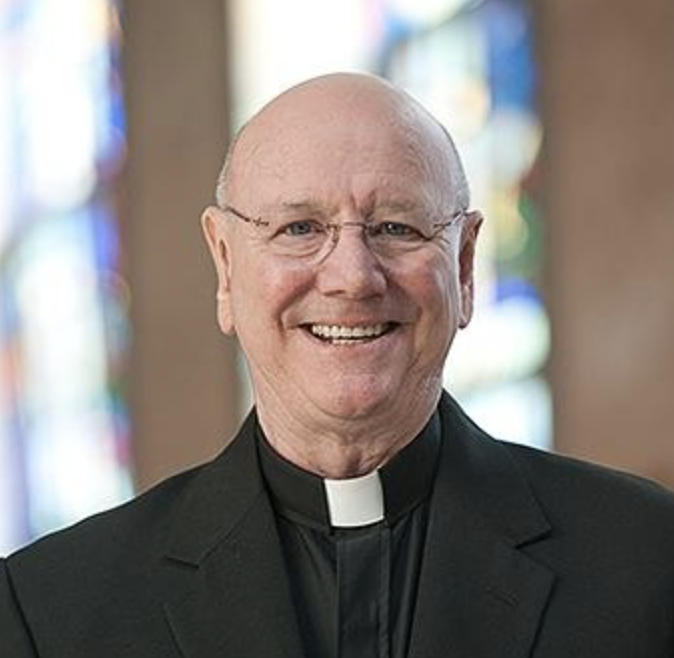BC Jesuit underlines social justice within new ‘Eucharistic Revival’ efforts
Fr John Baldovin of Boston College presents ‘Eucharistic Revival’
November 18, 2022
“Give us this day our daily bread.” Fr John Baldovin of Boston College presented a highly anticipated theology lecture last Tuesday challenging the Eucharistic Revival put on by the US Conference of Catholic Bishops to focus more on the desired effects of the Mass.
The mission of the Eucharistic Revival, according to their website, is to “renew the Church by enkindling a living relationship with the Lord Jesus Christ in the Holy Eucharist.” Catholics have long believed in the Real Presence of Jesus in the Eucharist, meaning that Christ is present in a real way in the Eucharist received at Mass, not just symbolically or metaphorically. The revival comes shortly after a Pew Research study found that one third of U.S. Catholics believe in the Real Presence.
According to Fr. Baldovin, the purpose of the lecture was to “put the current US Eucharistic Revival in the context of the Eucharist as communal celebration as well as its consequences for Christian living – ethics and justice.”
Fr. Baldovin confronted the USCCB’s focus on the Real Presence, citing how belief in the Real Presence was not enough to create real impact or change in the Church or the world. Rather, the focus needed to include both teaching about the Real Presence and how Catholics are sent out from receiving the Eucharist to evangelize, serve the vulnerable, and be charitable to all.
Reception of the lecture was very positive from students and faculty. For faculty members like Prof. Kelly Spoerl of the theology department, it was difficult to describe a highlight. Prof. Spoerl would recall “I was delighted by the lecture. I thought Fr. Baldovin presented his material in a completely accessible and engaging way. I loved how he incorporated materials from across the Catholic Tradition to illuminate his topic: references to Pope Francis as well as St. Thomas Aquinas.”
Fr. Bernard Disco, a member of the monastic community and professor of the theology department, had Fr. Baldovin as the director of his doctoral dissertation when graduating from Boston College. When reflecting on some highlights of the lecture, Fr. Disco noted “I agree with Fr. Baldovin’s main argument that the US Bishops are placing too much emphasis on only one aspect of the Eucharist, but not enough on how it is also meant to also make recipients live more consciously as members of the Mystical Body of Christ, alive and active in the world today. That’s what communion is for: a public witness, not merely to foster private devotion, as valuable as that is.”
Students were just as intrigued by the lecture as professors were. Senior Noah Manuel, a biology major, was fascinated by Fr. Baldovin’s connection between the Eucharist and ecology. He stated, “We take in Christ, and we are then called to act in His image, to bring Christ to all in the world. It’s about caring for people, caring for nature, which is God’s creation. It is a call to go out into the world and to care for all creation. What is said at the end of Mass? Go in peace and glorify the Lord by your life.”
Kelly Geraghty, a sophomore peer minister from the Office of Campus Ministry, agreed with Manuel. “I think that the major lesson I took away from the lecture was that the Eucharist is pointless if we are not living it out every single day in our life. We need to be able to take our faith and live it out into the world and touch others with it in the same way Jesus did.”
Fr. Disco also agreed. “The full and enriching meaning of the Eucharist can’t be squeezed into a ‘tweet.’ It’s not just for a child’s rite of passage, it’s the Body and Blood of Christ, the Bread of Life. The Eucharist bears the message and gift of a divine and eternal love that would change lives for the better if people took the time to learn and revere what really goes on.”
Fr. Baldovin was invited to campus by a board from the theology department made up by Prof. Spoerl, Fr. Disco, and Prof. Patricia Sullivan. According to Prof. Spoerl, parishioners from local parishes were also invited to attend the lecture. Fr. Baldovin’s lecture was well attended by students, staff, faculty, and members of the monastic community. The lecture comes about from a grant given to the theology department to be used in inviting more speakers discussing pertinent topics in theology around the U.S. and the world.



